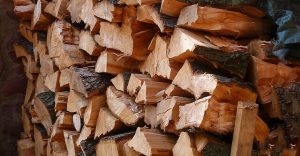Wood can be purchased in cords. A full cord of wood is four feet high, four feet wide, and eight feet long, or 128 cubic feet of stacked and arranged firewood, with approximately 600 to 800 pieces of firewood.
The cost of a Cord of Wood
So, how much does it cost to buy a cord of wood? The average cost is between $150 and $200 for the entire cord. However, prices can range from $120 to $400, depending on the type of wood, whether it’s already chopped or not, and the time of year. It is not uncommon for the price to rise to $500 during the winter months, especially if the product is kiln-dried.

The size of each piece of wood has a big impact on how much firewood a cord can hold. A cord of solid firewood should include at least 85 cubic feet of solid firewood on average.
Face cord, furnace cord, and stove cord are some of the various terms for stacked firewood. These are normally 4 feet high by 8 feet long, with the length being significantly less than the full rope. These might cost anything from $60 and $100.
Additional Costs
When looking for a cord of wood for sale in your location, keep the following costs in mind:
Delivery — expect to pay extra for firewood delivery to your location. The average cost per mile is roughly $2.
Stacking — If you don’t have time to stack your ordered wood, you can pay someone to do it for you for a starting fee of $30, which may increase based on the total volume of wood.
Cutting – firewood is sold in a variety of sizes and shapes, and you may want to cut them into uniform proportions for easier stacking.
Moisture metre – If you want to check the moisture content of the wood you’re buying, you’ll need a moisture metre. This will set you back roughly $25 and will help you prove that you are indeed purchasing kiln-dried wood as the supplier claims.
Factors Influencing the Price of a Cord of Wood
As previously stated, a variety of factors can influence the total amount you will incur. Here are a few examples:
The most well-known cord is a complete chord, which measures 4′ x 4′ x 8′. Face cords, stove cords, and furnace cords are examples of various sorts of cords. Typically, these sorts are sold for household use. The firewood piles are also 4′ high x 8′ wide, however they are only 16″ long.
Sort of wood – there are a lot of options when it comes to wood varieties, and prices vary depending on how popular the type of wood you want to buy is. This, of course, is contingent on your primary motivation for purchasing in the first place. Hardwood and softwood are the two main options. Softwood is usually less expensive than hardwood.
Whether it’s stored or kiln-dried, wood goes through a series of steps to ensure it’s completely dry, burns evenly, and doesn’t produce a lot of smoke. As a result, they’re more expensive.
Location – If you live in a chilly climate, expect to pay more for full cords. This is due to the increasing demand for firewood in these areas.
Season – Expect to spend several hundred dollars on firewood for the winter supply whenever you wish to acquire it. Winter is a period when firewood is very expensive, so you should stock up before the cold season arrives to save money.
Other Cord Types Explained
Typically, sellers do not sell firewood in its standard unit of measurement, especially if the firewood will be used to heat your home. As a result, you’ll need to convert the price to the simplest unit.
As an example, consider the following:
Face Cord – A face cord of wood costs about $75 and is primarily used for forest fuel. You may expect the cord to be 4 feet tall and 8 feet long. Each component should be about 16 inches long on average.
Now that you know how much is the cost of a cord of wood, you should also know the tips in buying.
To convert the price to a full cord, divide the length by the length of a full chord, which is 48 inches, and then multiply by the price. 3 × $75 = $225 = 48 inches (full rope length) x 16 inches (face cord length). In sum, a whole cord of forest firewood costs $225.

Stove Cord – Stove cord is typically around $60 and measures 4 feet by 8 feet. Because each component is around 12 inches long on average, the conversion is: 48 inches (whole cord length) x 12 inches (stove cord length) = 4 x $60 = $240. In total, a stove cable will set you back roughly $240 for a whole cord.
Furnace Cord – Furnace cord normally costs around $85 and comes in 4 x 8 foot lengths. Each piece of firewood is about 18 inches long. So, 48 inches (full cord length) less 18 inches (furnace cord length) is 2.67 x $85 = $227 In total, the furnace cable will cost roughly $227 in full chord equivalent.
Do you still have doubts about the length of a whole cord? Here are some examples to put things into perspective.
A full cord softwood weighs roughly 2,500 pounds on average. A full cord hardwood, on the other hand, can weigh up to 5,000 pounds.
The average length of a single piece of firewood is 16 inches. That’s three-quarters of the width of a complete rope.
A compact pick-up truck or SUV can carry about a third of a cord of wood. A huge pickup truck or truck, on the other hand, can transport one whole cord.
Purchasing Advice
Now that you know how much a cord of wood costs, you should also know some buying strategies.
Because buying firewood can be so perplexing, some vendors may try to deceive you. So, here are a few pointers to help you avoid this:
Do not purchase firewood from a vendor who sells in units other than the standard ones. Pick-up truckloads, station waggon loads, and other types of units are among these.
Buying firewood over the phone is not a good idea. It’s better if you go straight to the supplier and inspect the wood in person to ensure that it’s of good quality.
You should also insist on the wood being cut to the correct burning length and stacked evenly. If the supplier piles the firewood at random, don’t accept it. A uniformly packed cord of wood will provide a more accurate volume estimate.
Make sure you have enough money to transport your wood. Renting a truck and heaving your own wood can save you money. Keep in mind that a short-bed pickup truck can only carry about a fifth or a quarter of a cord, whereas a pulpwood truck can carry four full cords.
